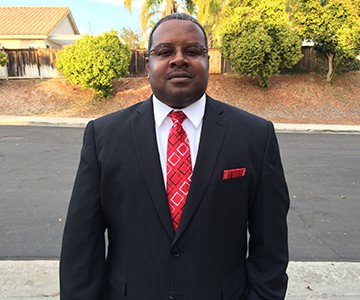Ex-military combat medic finds adrenaline rush in Temecula Respiratory Therapy program

“For 21 years, I was groomed to be in a high intensity area, thinking on my feet, and I’m not going to lie, I miss the adrenaline rush,” says Robert Ford, Respiratory Therapy student on the Temecula campus. After 18 months in the program, he is finding some of that all-important, in-the-moment action when he is in clinical rotation.
“You can only learn so much in the classroom with a simulated mannequin,” says Robert. “But to go to the clinic and interact with the patient…it gives you a personal and professional test; how will I handle this?”
Patient care can take an unexpected and sharp turn toward crisis. “Respiratory Therapists are one of the most important people in the room when a patient needs help or is about to die,” says Robert.
“The whole time I was in the Army, I was doing some sort of training in the medical field, re-certifications, and promotions that come with additional skills and responsibilities,” he says. “All I know is school and work,” says Robert, who has already earned a BA degree in Technical Management.
When he retired from the Army in 2013, he gave the next phase of his life careful thought. Robert wanted to build on his medical experience. It was also a family tradition as his wife, April, is a Surgical Technology instructor and his daughter, Alexis, a licensed pharmacy technologist. But it was his mother-in-law, Cheryl, who, as a Critical Care nurse steered him in the direction of respiratory therapy.
Robert enrolled in a Respiratory Therapy program at another college, but was not sure he had made the right move. “The other college wasn’t WASC-accredited and if I wanted to get my Bachelor’s, I couldn’t transfer credits.”
Before class started, Robert decided to explore other options. “The day I found SJVC online is the day I went in, toured the campus and heard the great news about all my credits being accepted,” says Robert. “I had the GI Bill, so it was a no-brainer. Yeah, we’re going to do this!” He completed the requirements and was admitted into the program.
Then the hard part hit.
Even though April and teens, Alexis and twins Marcus and Donte, were happy to have Robert home after so many years of his long deployment to distant places, that included three tours in Iraq; the stresses of full-time college had its own difficulties.
“The family gave me a lot of quiet time to study because they realize I am in a program that is very demanding,” says Robert. “It was a strain. April was working full-time and still picked up a lot of the slack around the home when I couldn’t.”
Robert also got a lot of support from Cheryl. “She was always sending me little messages to keep me going, and giving me a ton of inside tips on being a Respiratory Therapist. She was awesome.”
His fellow Respiratory Therapy students mirror the camaraderie of his military outfits. “I have classmates on the same journey,” says Robert. “Someone sitting next to you knows what you are going through. We encourage each other, push each other, and it makes a lot of difference.”
Robert was frequently on the Dean’s List. “I love the satisfaction of completing something and doing it well,” he says.
One of his proudest moments was when he was selected by his program peers to speak at their White Coat ceremony. He has also been asked by his instructors to speak to incoming Respiratory Therapy students at Orientation. “I tell them ‘study, study, study, dedication and discipline. It takes all of that.'”
“Robert already has his BA, but wanted to get back into the medical field,” says John C. Hall, Dean of Student Services. “He would love to be a rep for a group such as the National Board of Respiratory Care and speak with others.”
Right now Robert is using that voice to motivate his 15-year-old sons. “Ask them and they will tell you ‘My dad is crazy about school,'” says Robert. “I email teachers, I check assignments and projects, because I understand the value of education.”
Robert has a strong sense of the real world that he wants his kids to hear and understand. “It’s a competitive world, and there’s no job just waiting for you. If you want the top position, you have to go get it. It’s like I am their professional life coach, but in the end I know it will mean something.”
He is willing to be an active role model and life-long learner. “I’ve still got a lot of life ahead of me. I might even discover something new.”